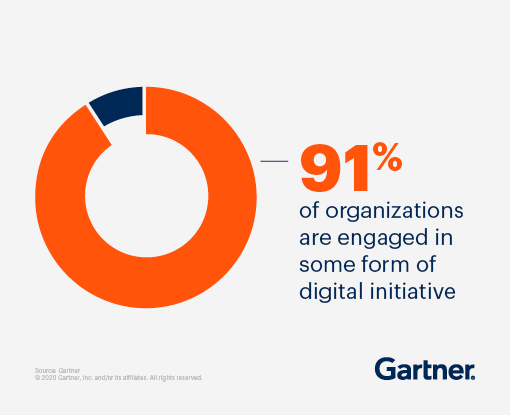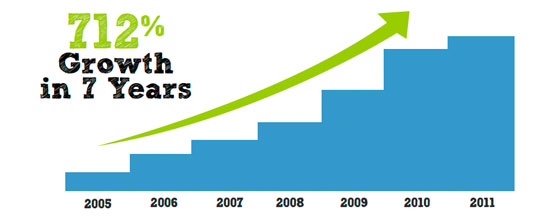Almost everything now takes place online due to technological advancements, so the importance of having a social media presence in a business cannot be understated.
On the other hand, digital transformation is at its peak, every industry wants to upsize its operations without spending hefty bucks. However, Some business owners do not believe digitization is necessary because they believe it is time-consuming and expensive and cannot be replaced by conventional marketing techniques. Well, that is a myth.
Marketing buzz phrases such as digital transformation, internet marketing, social media, etc. continue to be popular in 2021, and for a good reason. A survey said that more than 70% of businesses’ spending on digital transformation to stay afloat in the highly saturated business world amid the pandemic. Covid-19 has led to the launching of transformation initiatives in 58 percent of organizations that haven’t yet done so.
Now, we know the meaning of digital transformation but do you ever think about how social media plays a pivotal role? Well, in this blog, we will throw some light on the role of social media in digital transformation and automation of business. Bue before that, let’s summarise the meaning of digital transformation for better understanding.
What is Digital Transformation?
Table of Contents


You have likely heard about digital transformation in some context since it’s become so popular in recent years. Essentially, this is not just a trend but rather a reality that isn’t going anywhere.
Considering the rapid growth of the digital economy, businesses especially need to know what digital transformation is, what it contains and what strategies and technologies will help them succeed in the years to come. Here, we will share how we mean digital transformation since there are quite a few different definitions of it.
Organizations can deliver value to customers through digital transformation by disrupting obsolete business methods, rethinking how technology is used, and why it’s crucial to advance into the digital age. It’s about understanding how digital strategies and technologies will lead to greater business efficiency and effectiveness.
Additionally, the digital transformation also includes business processes and company ethics.
Here, you can consider how a popular ride-sharing company, Uber became a billion-dollar company without owning a single car. Commuters no longer need to roam around streets to find a cab as they can book a taxi online with their smartphones.
After getting inspired by the success of Uber, many conventional taxi business owners have embraced the Eber Taxi platform because it enables them to automate, digitize, and upscale their operations that they never envisioned. From carrying out promotional activities to oversee business performance, digitization offers much more to businesses.
Now we all are aware of the meaning and need of digital transformation in the business. So it’s time to discuss how social media accelerates the process of digitization and what role does it play? Here we go.
Role of Social Media in Business Digital Transformation
Social media’s broad reach and widespread use in the modern digital era has become a solid way to stimulate conversation within the social sphere. There is an area in which people meet, communicate, express themselves, and have fun. It is not something new that social media sites such as Twitter, Facebook, and others are increasingly popular with individuals, but not everyone is utilizing them to benefit their businesses.
They failed to realize the importance of taking advantage of the wonderful opportunities provided by social media and how it is a great way to market their own businesses. Business Wire said that 84% of B2B buying decisions are made through social media, suggesting that enterprises cannot ignore how social media can contribute to digital transformation.
A recent study conducted by Clutch and Smart Insights evaluated the current state of social media marketing by surveying 344 social media marketers worldwide to determine the importance of social media, the best content to share, common challenges, and what resources businesses use to utilize social media.
And the results are quite shocking.
- 52% of social media marketers admit that social media can help them to generate leads, boost sales and revenue.
- They also come up with the conclusion that below are the most popular social media platforms.
- Facebook (2.85 billion users)
- LinkedIn (774+ million members)
- YouTube (2.3 billion users)
- Twitter (206 million users)
- Instagram (1 billion users)
- Almost 80% of brands share original content on social media platforms.
- Social media is more important for B2C brands than B2B companies globally.
Discover the Role of Social Media in Digital Transformation


Social media plays an important role in business when it comes to reaching the global marketplace and getting more customers. Taking advantage of this tool is one of the most efficient and highly effective ways to attract targeted traffic.
Several ways exist for businesses to use social media to accelerate the success of digital transformation and digital advancements. Let’s check them out.
Upscale Brand Authority
As a result of social media being a platform that cultivates engagement and answers all of your clients’ questions about your brand builds trust and makes your brand more authoritative. You can also demonstrate your expertise in that niche by sharing great content on social media consistently.
As customers become tech-savvy and discriminating, they become more discerning. An interested customer will browse your site and social media before they make a decision. Will the storefront be empty, or will there be an abundance of information? Having robust profiles that you update frequently will help establish your brand as trustworthy, knowledgeable, and approachable and help build your authority on social media.
Boost Your Conversions Rate
Your business can capture targeted leads using social media. People constantly share information about themselves on social media and express their preferences. When creating new content or ads, this helps target them. It is only one part of the equation to generate high-quality leads. And the next most important part is to convert those leads into sales.
Here are a couple of ways that can help you boost conversion rates through social media.
Generating Social Proof
Establishing brand credibility online is how social proof works. Prospects will also feel reassured by this. Don’t sound like you’re selling anything. Let them know what your product can do for them. Your website’s reputation can be enhanced by using social proof from social media platforms.
Publish User-Generated Content
You need to create compelling content on social media for your audience. Wouldn’t it be better if your loyal fans created engaging content for you? You are more likely to receive positive mentions from people who already follow you on social media. Your audience can be motivated to take action by featuring them on your profile. Quality content is as good as gold. Social proof increases your brand’s conversions by providing high-quality social proof.
Humanize Your Brand
Social media is not all about likes and comments. According to TIME, the 80-20 rule suggests that 80% of social media posts should be about consumers, while only 20% should be about the business. An approach like this feels more genuine and approachable since it is less sales-driven. Giving your social media presence a human touch by posting a few photos of daily life at the office and involving important stakeholders and speakers is a great way to have conversations about industry topics.
You can see how social media helps you move forward towards the digital transformation process from the above points.
Social Media as An Digital Transformation Accelerator
With social media marketing today, we can reach a wider audience than ever before, and it has shown to be a very powerful tool. Social media provides many benefits beyond simply connecting with consumers. Your company can benefit from this tool in other ways, from understanding more about your target audience to building brand awareness to retaining existing customers. Social media has it all.
It may seem scary and overwhelming to commit to digital transformation, but integrating social media into the process will yield better results than a seamless digital experience.






